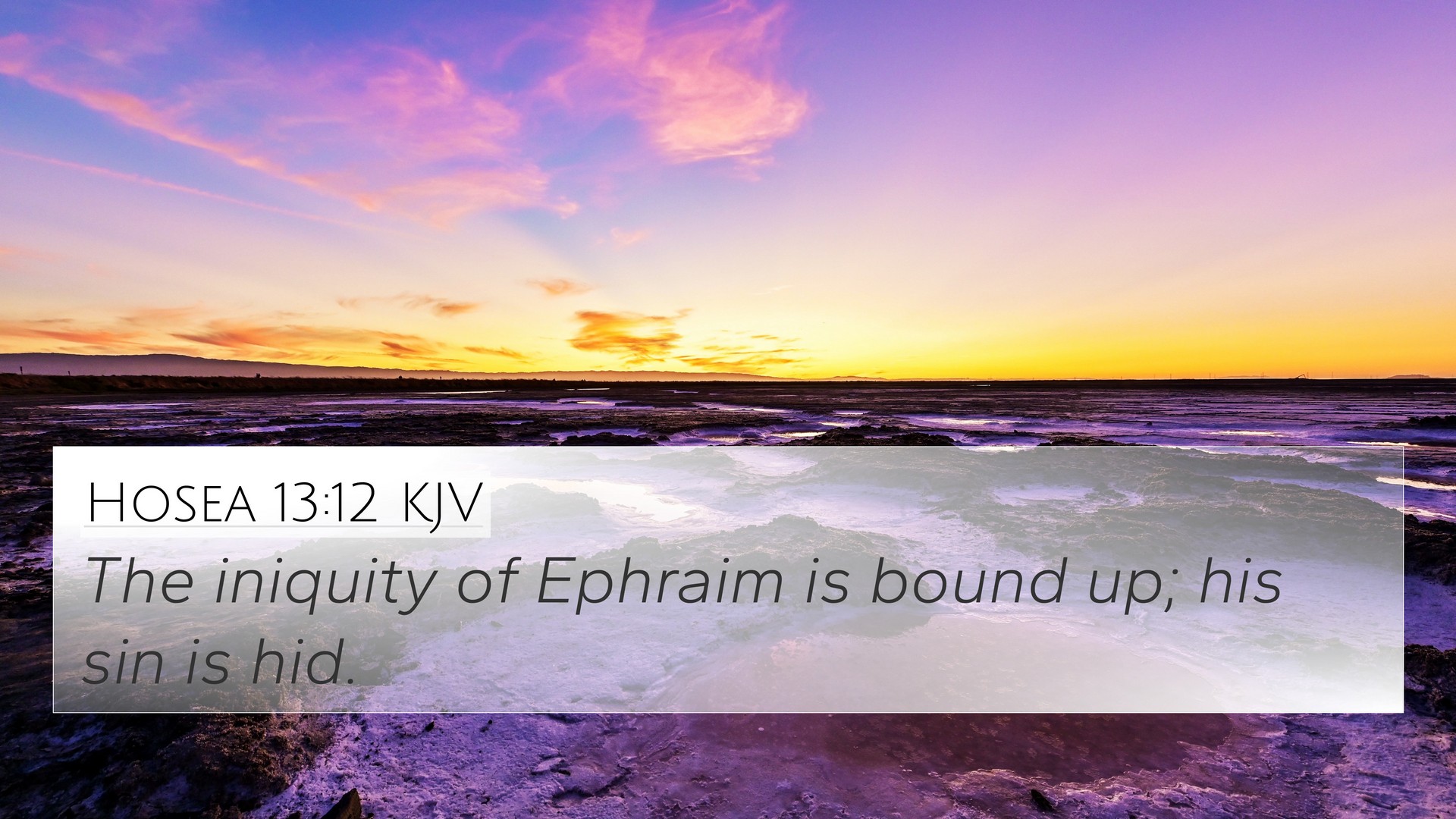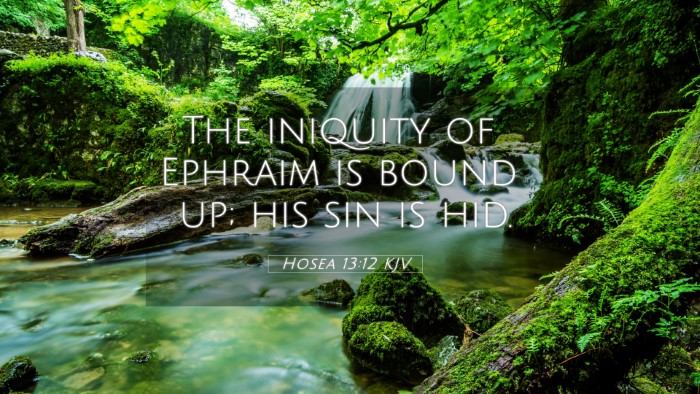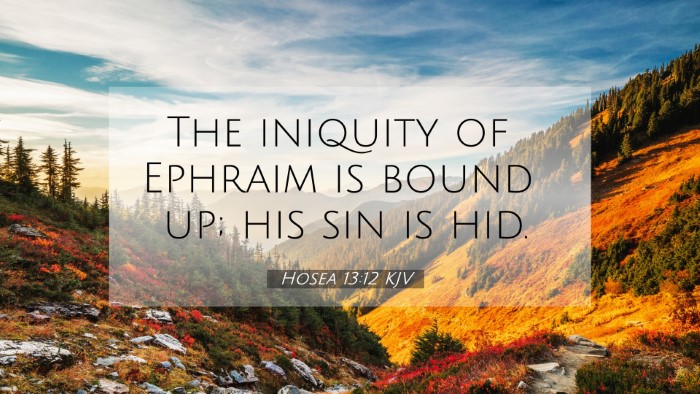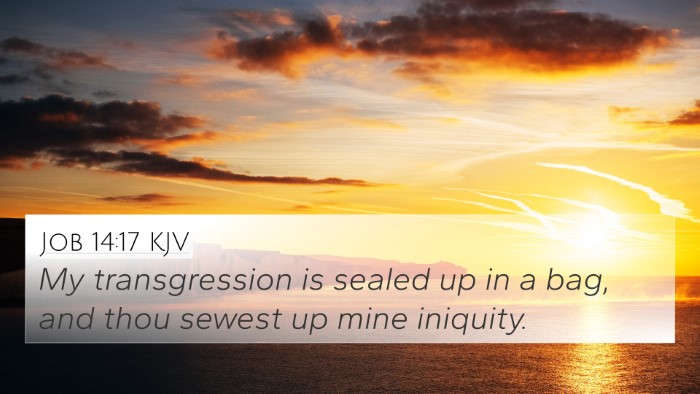Old Testament
Genesis Exodus Leviticus Numbers Deuteronomy Joshua Judges Ruth 1 Samuel 2 Samuel 1 Kings 2 Kings 1 Chronicles 2 Chronicles Ezra Nehemiah Esther Job Psalms Proverbs Ecclesiastes Song of Solomon Isaiah Jeremiah Lamentations Ezekiel Daniel Hosea Joel Amos Obadiah Jonah Micah Nahum Habakkuk Zephaniah Haggai Zechariah MalachiHosea 13:12 Similar Verses
Hosea 13:12 Cross References
The iniquity of Ephraim is bound up; his sin is hid.
Uncover the Rich Themes and Topics of This Bible Verse
Listed below are the Bible themes associated with Hosea 13:12. We invite you to explore each theme to gain deeper insights into the Scriptures.
Hosea 13:12 Cross Reference Verses
This section features a detailed cross-reference designed to enrich your understanding of the Scriptures. Below, you will find carefully selected verses that echo the themes and teachings related to Hosea 13:12 KJV. Click on any image to explore detailed analyses of related Bible verses and uncover deeper theological insights.
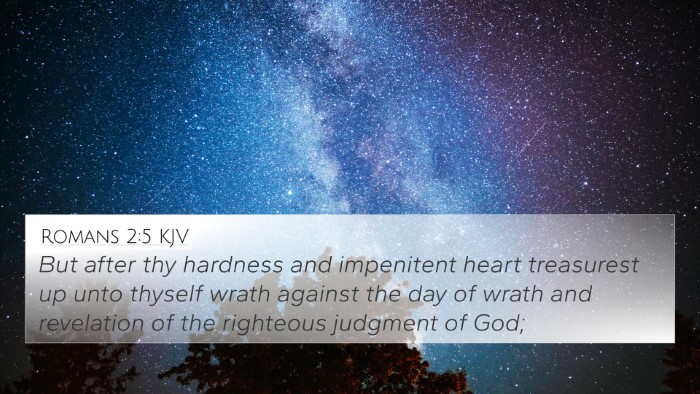
Romans 2:5 (KJV) »
But after thy hardness and impenitent heart treasurest up unto thyself wrath against the day of wrath and revelation of the righteous judgment of God;
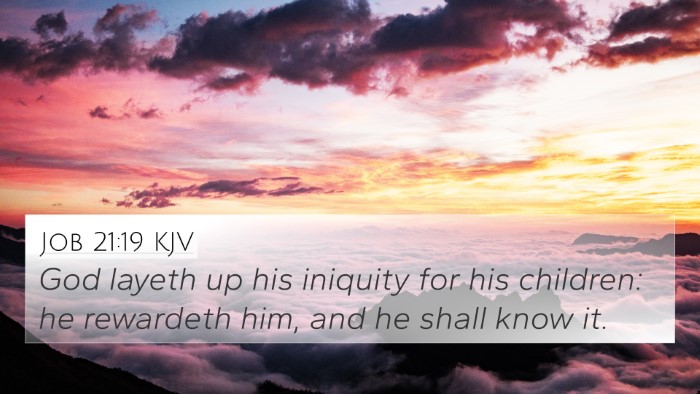
Job 21:19 (KJV) »
God layeth up his iniquity for his children: he rewardeth him, and he shall know it.
Hosea 13:12 Verse Analysis and Similar Verses
Understanding Hosea 13:12
Verse in Context: Hosea 13:12 states, "The iniquity of Ephraim is bound up; his sin is hid." This verse highlights the theme of hidden sin and consequences for the Israelites, particularly the tribe of Ephraim.
Summary of Commentary Insights
This verse reflects a significant message about the spiritual condition of Israel (Ephraim) and the impending judgment due to their unrepentant nature. The combined insights from Matthew Henry, Albert Barnes, and Adam Clarke provide a deeper interpretation.
Thematic Analysis
- Hidden Sin: All three commentators emphasize how sin can remain concealed within an individual or a community. Matthew Henry notes that while sin may be hidden, it is not unnoticed by God, reflecting divine judgment.
- Bound Up Iniquities: Albert Barnes interprets "bound up" as sin that is tightly held, suggesting a person's inability to free themselves from their transgressions, which leads to spiritual bondage.
- Ephraim's Condition: Adam Clarke provides insight into why Ephraim is highlighted - being a symbol of the northern kingdom of Israel and its moral corruption. Clarke points out that sin hides one's true state from both God and man, leading to destruction.
Cross-References for Further Study
For a comprehensive exploration of the themes in Hosea 13:12, consider these cross-references:
- Psalm 90:8: Discusses how God is aware of hidden sins.
- Proverbs 28:13: Highlights the danger of concealing transgressions.
- Isaiah 44:22: God's ability to redeem and remove iniquity.
- Ezekiel 18:31: A call to cast away all offenses to become a new heart.
- Romans 2:16: Speaks of God's judgment based on the hidden actions of individuals.
- 1 Corinthians 4:5: Encouragement that God will reveal the hidden things of darkness.
- Galatians 6:7: The principle of reaping what is sown, aligning with the consequences of sin.
Commentary Highlights
Matthew Henry notes that the emphasis on sin "bound up" indicates a cumulative effect of iniquities leading to a spiritual deadlock. It denotes not only the personal accountability of Ephraim but also the collective moral decline of Israel.
Albert Barnes elucidates that this passage serves as a grave reminder that although people may think they evade consequences, divine justice is the ultimate reckoning. He advocates for a period of introspection and repentance before it is too late.
Adam Clarke stresses the need for awareness regarding our spiritual health. The metaphor of hidden iniquity serves as a prompt for believers to seek God earnestly, confessing and forsaking sins before they bind them irrevocably.
Practical Applications
Understanding Hosea 13:12 encourages believers to:
- Engage in Self-Examination: Regularly assess one's life for hidden sins that could disrupt their relationship with God.
- Seek Accountability: Establish relationships with trusted individuals who can provide guidance and support in spiritual matters.
- Emphasize Repentance: Recognize that repentance is essential for spiritual freedom and restoration.
- Hold onto Faith: Trust in God's ability to cleanse and redeem the soul despite past transgressions.
- Utilize Tools for Cross-Referencing: Engage with Bible study resources to identify connections and insights across different scriptures for deeper understanding.
Conclusion
Hosea 13:12 reminds believers of the serious nature of sin and the importance of transparency before God. By recognizing the hidden aspects of wrongdoing and the consequences thereof, individuals can strive for a more authentic relationship with God.
Keywords for Further Study
For those interested in further exploration of scriptural themes, consider researching:
- Connections between Bible verses
- Comparative Bible verse analysis
- Bible reference resources such as concordances and cross-reference guides
- Identifying connections between Old and New Testament teachings
- Cross-referencing Psalm insights with New Testament teachings
